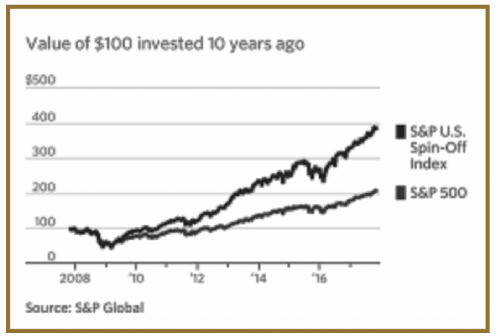Conscious Uncoupling: Are Spin-Offs Good For Investors?
 Spin Cycle: When It’s Time To Go
Spin Cycle: When It’s Time To Go
Lifestyle mogul Gwyneth Paltrow “broke the internet” in 2014 when she and her then-husband, Coldplay frontman Chris Martin, announced the “conscious uncoupling” of their marriage. Initially mocked in the media for their use of the twee term, Paltrow and Martin have thrived ever-after—in separate relationships—while maintaining what appears to be a loving and stable extended family. War of the Roses, it ain’t. Of course, not all separations go this smoothly—whether in personal or in corporate life. Yet, if done right, it can be a win-win for all parties.
We’re in the midst of spin-off fever as more companies than ever are deciding to consciously uncouple by selling off business units and subsidiaries at a rapid pace. According to Bloomberg, last year, there was a 54 percent increase in companies announcing planned spin-offs on U.S. exchanges. Part of this is due to buoyant U.S. markets, increased investor activism to break open the perceived value embedded in large conglomerates, and a healthy performance in the spin-off indices and the Exchange-Traded Funds (ETFs) that track them. It doesn’t hurt that such high-profile corporations as Danaher Corporation (Fortive), Altria (Phillip Morris), DowDupont (Corteva, Dupont, Dow) and Brookfield Asset Management (Brookfield Business Partners, Trisura), to name only a few, have jettisoned business units in recent years.1
Spin City: Corporate Rationale For Spin-Offs
Spin-offs happen when a corporation creates a new public company from one of its subsidiaries and issues stock pro-rata to current shareholders in the new business. There are as many reasons to spin off a business unit as there are to acquire one. A cynic might say that CEOs like to look busy and there’s nothing like the frenzy of an imminent Initial Public Offering (IPO), merger and acquisition, or spin-off to mobilize the troops—and to enjoy the lavish hospitality courtesy of your local investment banker who stands to profit handsomely for her efforts on your behalf.
Yet spin-offs happen for many sound business reasons, too. In some cases, a potential deal to be acquired by another company or to acquire one yourself could be kiboshed due to regulatory restrictions on monopolies or conflicts of interest. Potential buyers might be turned off by some of the businesses in which a conglomerate is involved, such as fossil fuels, weapons manufacturing, or other endeavours which would not pass muster with the firm’s board of directors. In this case, it’s necessary to excise the offending business unit to facilitate the deal.
For very large conglomerates, some parts of the business may be thriving while others lag, dragging down profits. By hiving off the laggards, it allows the better performing business to shore up its balance sheet or invest in other parts of the business that may offer a higher return on investment. This could lead to the corporation being re-rated in the marketplace at a higher multiple, thus rewarding shareholders and senior management. However, this strategy is frowned upon if it’s perceived that the company is “taking out the trash” and keeping the best bits for itself.
Sometimes the parent company is perceived as holding back the growth of younger, more dynamic business units. Cutting the umbilical cord of Mother Corp gives these faster-growing entities a better chance to thrive in a more suitable entrepreneurial culture. Lastly, the parent company may simply not have enough cash to invest in a fast-growing division and taking it public is the best way to fund it.
Money Spinner: Do Spin-Offs Benefit Investors?
Spin-offs are like catnip to both active traders and value investors—two investment-style groups that rarely intersect.2
Active investors like the historical outperformance of spun-off companies. One study reviewed the stock market prices of parent and subsidiaries from 1965 to 2000 and found that holding the spin-offs’ shares for 22 months and, at the same time, holding the parents’ shares for 15 months would have yielded better returns compared to benchmarks.3,4
Generally, investors prefer more focused companies to highly diversified ones. (Although, aren’t investors always admonished to diversify? Yet another investing anomaly.)
Public spin-offs are also more tax efficient than straight sales which would incur capital gains taxes.5
On the other hand, value investors are bargain hunters and like the margin of safety they get from the potential mispricing of the spun-off company. Spin-offs are mispriced for several reasons:
- As a new business, it may not have analysts following it and issuing reports.
- It will have a smaller capitalization than the conglomerate and, therefore, a different risk profile which may be unsuitable for some investors.
- Being unfamiliar to investors, the new shares are likely to be sold.
All of these could act to temporarily depress the price as supply of the shares in the new company will exceed demand.6

Source: https://www.wsj.com/articles/break-up-and-die-why-spinoff-fever-cant-last-forever-1510580248
Who’s Spinning Whom?
The Bottom Line
Although investing in spin-offs can be lucrative, it’s wise to remember two facts: past performance does not guarantee future success. There are plenty of recent exceptions to the “spin-to-win” narrative. Just look at the lacklustre performance of General Electric, DowDuPont, and Thyssenkrupp which are all lagging their respective indices.7
Tracking spin-offs is a lot of work and timing is key. For those interested in investing in spin-offs, an ETF such as Guggenheim S&P Spin-Off ETF (GMGX) or VanEck Vectors Global Spin-Off (SPUN) would make sense. Research shows that the performance of international spin-offs is similar to that of U.S. spin-offs.8
Is this new era of de-conglomeratization for you? Before you take the plunge to buy, practice “conscious coupling” by asking yourself these questions:9
- What are some of the potential “transition risks” for the new business? And, is the risk/return profile appropriate for you?
- Do you understand the business operations of the subsidiary?
- If the spin-off comes from a current holding in your portfolio, do you want to keep the new shares? Do they fit with your investment goals and risk-tolerance?
- What are the transaction fees and tax implications of holding or selling the new shares?
- How will the market cycle affect the new subsidiary?
- How dependent was the subsidiary on the parent company in terms of cash and business generation?
- Who will sit on the subsidiary’s board? Will the board be comprised of members from the parent company?
Rita Silvan, CIM, is the former editor-in-chief of ELLE Canada magazine. She is a freelance financial journalist and the editor-in-chief Golden Girl Finance (www.goldengirlfinance.com), Canada’s leading digital magazine about women and financial matters. She is based in Toronto and can be reached at rita@ritasilvan.com.
Sources:
- https://www.bloomberg.com/news/articles/2018-07-20/frenzy-of-spinoffs-swells-to-fastest-pace-since-financial-crisis
- https://spinoffinsights.com/2018/10/17/review-of-historical-spin-off-performance-the-opportunity-for-active-investors/
- https://krannert.purdue.edu/faculty/mcconnell/publications/The%20Stock%20Price...2013%20jpm.2015.42.1.143.pdf
- https://www.spglobal.com/marketintelligence/en/news-insights/research/capital-market-implications-of-spinoffs
- https://www.economist.com/business/2013/05/04/the-art-of-the-spin-off
- https://www.theglobeandmail.com/globe-investor/investment-ideas/heres-why-value-investors-find-spin-offs-so-intriguing/article34566048/
- https://www.economist.com/business/2019/05/16/do-corporate-spin-offs-create-shareholder-value
- https://www.spglobal.com/marketintelligence/en/news-insights/research/capital-market-implications-of-spinoffs
- https://spinoffinsights.com/2018/10/17/review-of-historical-spin-off-performance-the-opportunity-for-active-investors/

